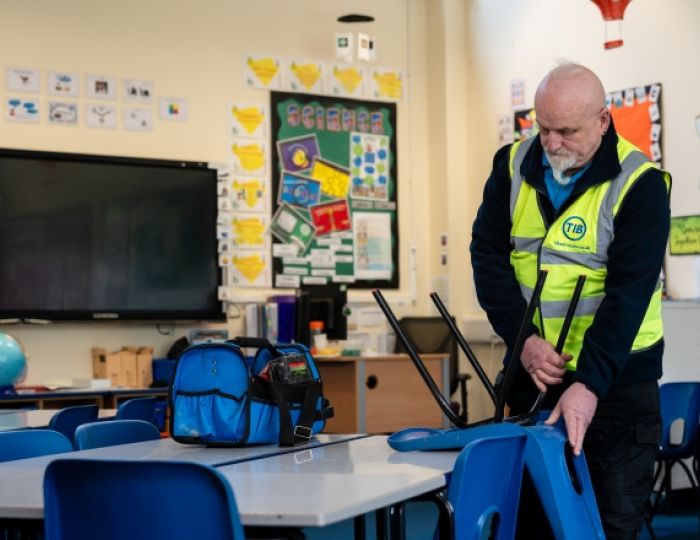What have you always wanted to know about teachers but been afraid to ask? For me, I’ve always been curious as to where they eat their lunch – in the staffroom, in the dining hall, alone in their classroom? And does it matter for your morale?
With a third of teachers leaving the profession within five years, the answers to these questions could unlock the secrets of retention. After all, if we find that teachers who eat together also achieve together, then it’s easy to encourage such behaviours!
That’s why Professor Becky Allen and I joined forces to create Teacher Tapp, a free daily app that asks teachers to answer three questions at the end of their working day. The questions change each day, they take around 30 seconds to answer, and afterwards you get to see what everyone else has written about their working day. From this we’ve been able to find out all kinds of juicy things about the secret lives of teachers…
A third of primary teachers were asked to cheat during the sats exams
Everyone hears the rumours, but reliable data about test cheating is rare. If you ask people whether they cheated, most will say ‘no’, regardless of the truth. However, we probed to see if teachers would admit to being asked to cheat – and we found that one in three was pressured to do so.
Most commonly they were told to provide an unwarranted reader, point out mistakes or give the class extra time. This does not mean a third of all teachers did cheat in the exams, but it does show the pressure is widespread.
Primary teachers do a lot of ‘pointless’ marking
On average, teachers mark for at least three hours per week, although some teachers report as high as 15 hours in a week. If no one would find out about the level of marking – not Ofsted, senior leaders or parents – then just 13% of primary teachers said they’d continue with the amount of time they spend marking. One in 12 said they wouldn’t do any marking at all if they could get away with it!
Marking in front of the telly is common
On any given night, around 40% of teachers across the country mark their pupils’ work while sitting in front of the telly. Female primary teachers are more likely to do this than male ones, and female teachers who have children are the most telly-marking of all, with around half ticking while watching on any given evening.
Emails take up almost a whole teaching day each week
Speaking with a primary headteacher at an event, she guesstimated that her staff ‘send about 10 emails a day and read about 20’. Assuming that writing an email takes three minutes, and reading one takes two minutes, that’s about six hours a week – equivalent to a whole teaching day.
Happily, we found primary classroom teachers are less afflicted by email fatigue than secondary colleagues. Almost all reported sending and reading fewer than 10 emails per day. However, this changes as teachers become more senior. The majority of primary heads received over 30 emails per day, and around 30% sent out that many each day too.
Some schools are introducing out-of-hours email policies
We’ve increasingly seen schools say they have introduced limits on when people can send or receive messages. However, this is still rare in primary schools. Only 5% have banned emails outside of working hours, and only 7% don’t allow ‘all staff’ emails.
Primary teachers spend lots of time searching for resources online
While a quarter of secondary colleagues spend no time at all online, the vast majority of primary teachers spend at least one hour per week looking for resources online, and one in six spends over three hours per week on it. Remember: anything you do for three hours per week is equivalent to doing it for almost three working weeks per year.
Naughty children are (mostly) priceless
People like to believe that all children are worth their weight in gold but, in economic terms, some children are probably worth more than others. For example, we asked how much of their salary teachers would be willing to forego if it meant they could get rid of the child they find most difficult to teach. Lots of teachers were horrified by the question, with several arguing it was inappropriate to put a cost on children. On the other hand, 18% of teachers did say they would give up a cash value ranging from £99 to over £1,000.
Later, we circled back to the idea of cash-for-kids and asked another question: ‘If your headteacher wanted to increase your average class size by five pupils, how much do you think your salary should rise as fair compensation?’ This time, people were much happier to answer – with two-thirds of teachers recording a price they would want to take in the children, ranging from £200 to £2,000 per child. And this time we received zero complaints about equating children to money. Why?
Probably because humans have different psychological reactions to losses versus gains, and to inclusions versus exclusions. It goes to show, however, that many of us can put cash values onto children, even if it’s uncomfortable to admit it!
Female teachers ask for pay rises far less often than men
Not only do men report that they have asked for pay rises more often than women, we found that women feel far more uncomfortable at the thought of doing so. 82% of women said they wouldn’t negotiate salary when offered a job, compared to only 61% of men. For headteachers, that gap widens even more dramatically. Just 20% of female heads said they would haggle over their pay, while a whopping 55% of men were prepared to battle.
Half of teachers would like to drop to a fourday week
As job pressures load up, it’s not surprising that so many teachers would like an additional breather day each week. The government is fond of this approach, and has pushed part-time work through its flexible working roadshows.
But here’s a scary thought – if just 40% of teachers dropped one day per week, we would need an additional 40,000 teachers to take their place. That’s more than we train in a year.
Primary teachers can make money out of personal tutoring
One in 12 primary teachers said they have made money this year by working as a personal tutor outside of their school. Tutoring is less common than for secondary colleagues (30% of maths teachers do some paid personal tutoring), but it’s still a way to boost your pay packet – which half of primary teachers said is at a lower rate than they’d like.
Laura McInerney is an education journalist and co-founder of Teacher Tapp; you can download the app for free via the App Store and Google Play.










